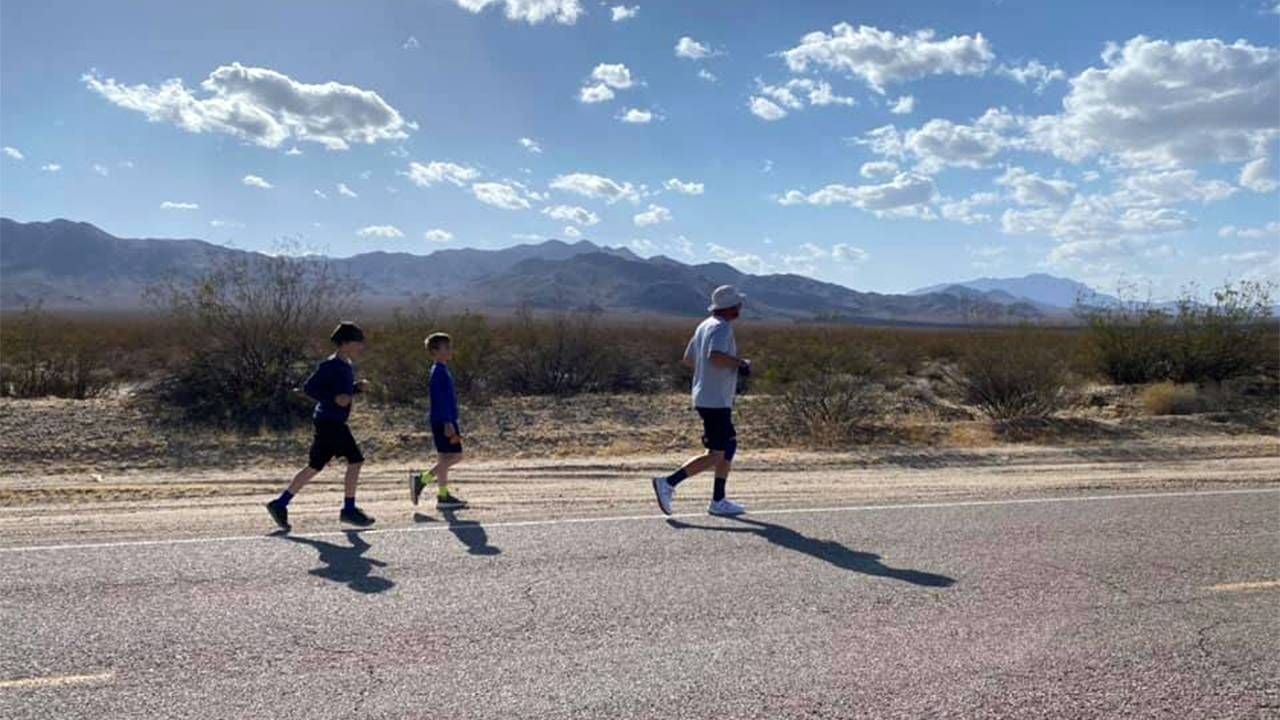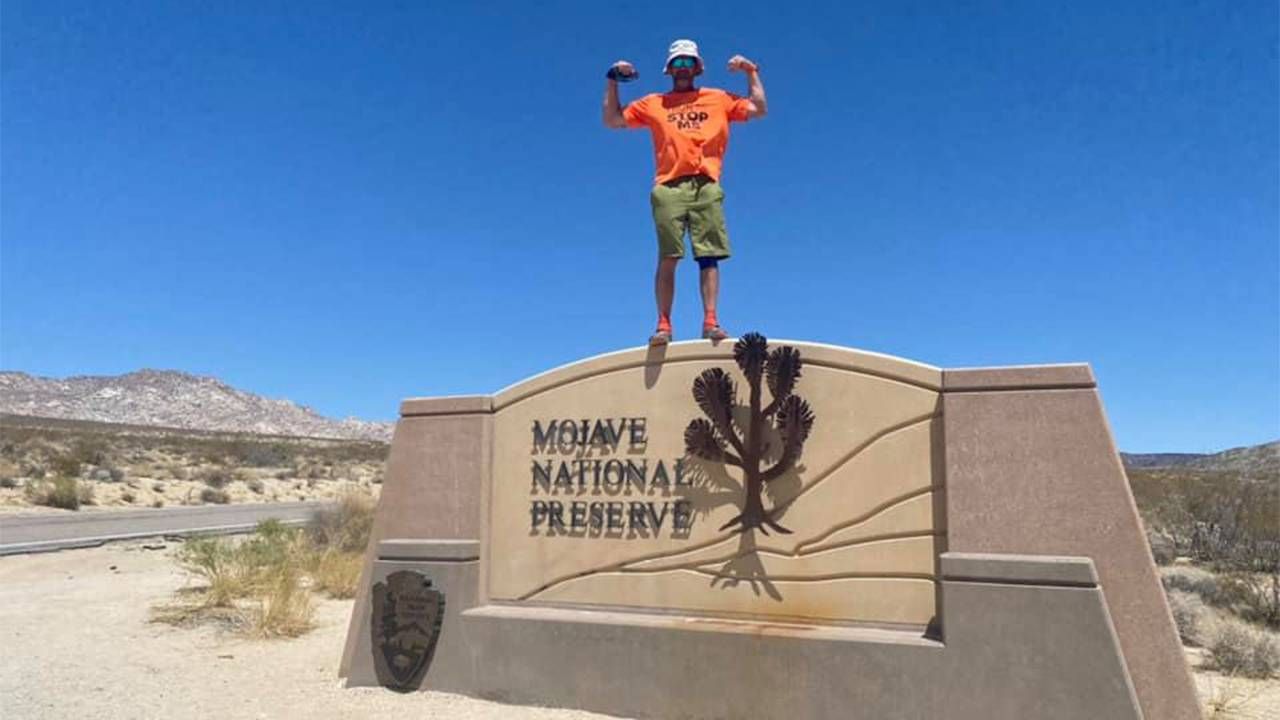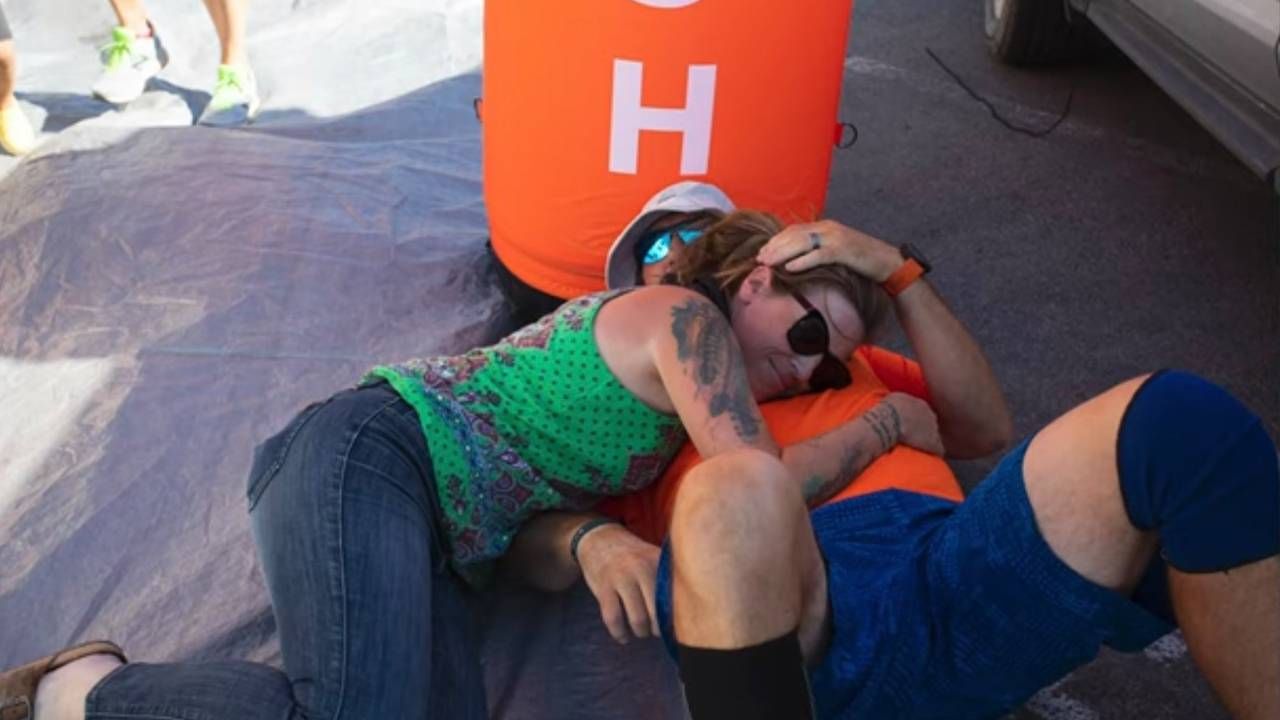My Husband Ran 220 Miles Through the Mojave Desert: Here's What He Learned
Commitment, companionship and fortitude carried him over the finish line
It was just after 5 a.m. My husband, Ed, let out a heavy sigh as he laced his running shoes and prepared for another hot day in the desert. It was Day 4 of an eight-day, 220-mile run through the Mojave, which spans four western states in America. After nearly 100 miles of running, he was fully exhausted. And he wasn't even halfway through.

Ed was the Segment 2 runner for MS Run the US, a cross-country ultra-marathon relay that levies the strengths of 19 courageous athletes to cross the entirety of the United States in 19 weeks.
Ed, at 50, was the oldest runner of the group. He had also been dealt the longest segment — running from Barstow, Calif. to Las Vegas in grueling conditions. (We live in Wonder Valley, Calif., about two hours from Barstow.)
"Rarely am I surprised by a runner's journey, because over the years I've learned anything can happen during the event, and it will."
"I'm hurting, baby," he told me, and eventually heaved himself up out of the chair, heading out into the chilly desert morning. By the time Ed ended the day, the temperature would hit nearly 90 degrees. He'd log 27.5 miles over 3,000 painful feet of elevation. And he'd begin to doubt himself, mentally, due to the pain.
"It gets into your head," he says now, three weeks after his portion of the run ended. "Yes, I trained physically. But it was the mental game that challenged me most. I knew it would be."
To understand why Ed's commitment to this run was so special, you need to know this: I had only known Ed a few months when I asked him to join the MS Run the US team. My mom had died from MS-related complications when she was just 48 years old. Ed had never even met her.
But he was an ultra-runner. He liked to do hard things. And he loved me. So, of course, when a spot opened up the following year, he was eager to become part of the team.
Prior to starting his leg of the relay, Ed had logged hundreds of miles in preparation. He'd done 50k training runs. Back-to-back 20-mile runs. Big elevation runs. But honestly, there wasn't much that could fully prepare him for the beating his body would take running so far in such a short amount of time.
"It's hard to explain what it feels like — to be completely broken physically, and know, in the back of your mind, you need to get up and run thirty more miles the very next day," he says. "Halfway through, my body was fully deteriorating."

He was right. About 15 miles into Day 5, Ed's Achilles tendon all but gave out completely. He was forced to end the day early, which in a relay meant he'd need to make up the miles on Days 6, 7 and 8 — 31.6 miles per day. It was daunting.
"I remember thinking, 'It's not over. It can't be over,'" he says.
'More Than I Could Mentally Handle'
To help Ed recover, I offered to take his segment on Day 6 to give his leg more time to heal. I started to run when I met Ed, but was by no means a runner - the longest I'd run during his training was 20 miles.
By that afternoon, he felt well enough to run nine miles on top of my 30+. We'd made up 40 miles in one day. Things were looking a little less bleak.
On Day 7, Ed's friend showed up as a surprise and ran the entire day in 90-degree heat to keep his mind off the pain. He ended the day in high spirits — but it didn't last long. His mom, who had driven out to Vegas to see him cross the finish line, fell and broke her hip during the day's run. It was almost too much to bear.
"All I remember thinking was, 'We're screwed,'" he says. "It was more than I could mentally handle. I was caught in the middle of a commitment I'd made to finish this run and the feeling that I should be with my mom in the emergency room all night. How do you even make that choice?"
"The biggest thing I learned was to allow people to help me."
But in the midst of so much chaos and pain, Ed was fully committed to finishing his segment. I took his mom to the emergency room while he took the night to recover.
More friends showed up to help keep him motivated — and to help keep us both sane. And the next afternoon, slowly, surely, he pulled himself across the finish line in 95-degree conditions, with our friends, our kids and the MS crew surrounding him.
The Accomplishment of Finishing an Ultra-Marathon
Ashley Schneider, the founder of MS Run the US, says she never doubted Ed's run would end any other way.

"Rarely am I surprised by a runner's journey, because over the years I've learned that anything can happen during the event, and it will," Schneider says. "When Ed's body started to break down, it meant long, hot, hard hours on the road. He showed up exactly as I expected him to. He never, ever, ever gave up. And just as expected, he crossed the finish line on his own two feet."
By the end of the run, Ed logged 190 of his 220 miles personally, but it's taken some time for him to recognize what he accomplished.
"It's going to take a while to fully process this experience," Ed says. "The biggest thing I learned was to allow people to help me. When I started this, I was doing it for people with MS, but I was also doing it for my own ego. I wanted to know I could do it simply because I love doing hard things.
Being so broken and having so many people reach out to help — to run with me, to support me, to cheer me on — the experience would not have been so deeply meaningful to me if it had been easy, if I hadn't had those struggles along the way."
Allowing Yourself to Be Humbled by Running
When it comes to advice for setting a goal and "running" with it, Ed offers one piece of advice.
"Throughout the run, I constantly asked myself, 'Who do you want to be?' Am I someone who follows through on my commitments or someone who lets people down? The truth is, finishing the run was more about dedication than it was about fitness. There's a quote I love that says, 'When one must, one can.'
I saw that with my wife the day she finished 30.5 miles on my behalf — more than ten miles than she'd ever gone previously. We're capable of so much more than we even realize. Allow yourself to be humbled by pushing yourself further than you ever imagined you could go. It's in those moments of humility that we learn the most about ourselves and those we love."
Interested in being part of the MS Run the US relay team? Visit msruntheus.org.

